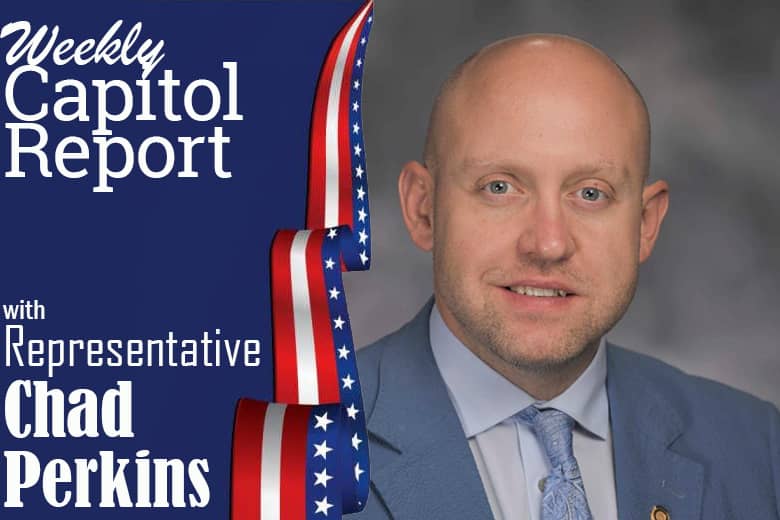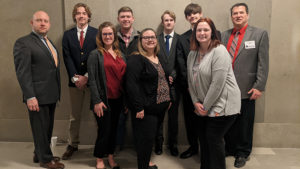
MISSOURI — House Approves Initiative Petition Reform (HJR 79)
 The Missouri House has approved a proposed constitutional amendment that would allow voters to decide if the current threshold to change the state constitution is too low. If approved by both chambers and voters, HJR 79 would modify the requirements for initiative petitions to change the state constitution.
The Missouri House has approved a proposed constitutional amendment that would allow voters to decide if the current threshold to change the state constitution is too low. If approved by both chambers and voters, HJR 79 would modify the requirements for initiative petitions to change the state constitution.
“Missouri is currently one of only 18 states that allow initiative petition to change their constitution. We have one of the easiest processes in the country for amending our constitution. Since the last constitution was written in 1945, our constitution has been amended more than 60 times,” said the bill’s sponsor, who noted the United States Constitution has been amended only 17 times since 1791.
Currently in Missouri, a proposed constitutional change requires the support of a majority of voters to be approved. Under HJR 79, a constitutional amendment would need the approval of a two-thirds majority for passage.
The bill’s sponsor said one of the reasons he filed the legislation is because of the money that is flowing in from outside Missouri in an effort to change the state constitution.
“The Secretary of State’s office I think testified to this in committee that it takes about three to three-and-a-half million dollars and you generally pass it. So they’re paying some people, either Missourians or maybe out of state, but they’re paying people to do it and the money is not coming from Missouri. That’s the problem with a lot of these IPs and why we need to reform them. I don’t think three to three-and-a-half million ought to be buying you a change in the constitution,” said the sponsor.
One supporter said he is in favor of the higher threshold for passage because the constitution should just be about the structure of government and the rights and freedoms that citizens have.
“All the other stuff – the way the government can boss you around – should be in statute not in the constitution, but special interests have weaseled it in to the point that our constitution is now 10 times the size of the United States Constitution,” he said.
HJR 79also proposes a change to the requirements to place a constitutional amendment on the ballot. Currently, an initiative petition requires signatures from 8% of voters in six of Missouri’s eight congressional districts to qualify for the ballot. HJR 79 would require signatures from 10% of voters in all eight congressional districts.
“In the past, they had to do it in two-thirds of the congressional districts, so people could go to St. Louis, Kansas City, Springfield, and Columbia and gather all the signatures they wanted,” said the bill’s sponsor.
He added, “I think they should have to go to all parts of the state – northeast, northwest, southeast, southwest, and central Missouri – and gather signatures. I think all of the people of the state count equally, and they should have to go to all parts if they’re going to change something as sacred as our constitution.”
During discussion on the House floor, members also approved an amendment to require the Secretary of State to conduct a review and comment process for the general public in each congressional district no less than 15 days before a proposed constitutional amendment appears on the ballot.
The sponsor of the amendment said, “I think it’s very important that each part of the state know how it will affect their portion of the state. Like a lot of us here know, things that may be vital in your area, may not be vital in mine, and what you do to correct your problem, may cause a problem for my district.”
The bill now moves to the Senate for consideration.
Supplemental Budget Bill Receives House Approval (HB 3014)
The House has sent a supplement spending plan to the Senate that will provide vital funding for K-12 schools and the state’s Medicaid program, as well as a statewide pay plan increase. HB 3014 authorizes nearly $4.6 billion in funding to be utilized in the current fiscal year that ends in June.
The bill includes more than $2.8 billion in funding for K-12 schools in Missouri. That total includes nearly $1.8 billion in Elementary and Secondary Education Relief funds that are allocated to local education agencies. With this, Missouri’s school districts are fully funded. The bill also includes more than $444 million for the Office of Childhood for stabilization services. Additionally, the plan allocates $75 million for the Close the Gap Grant Program.
The House Budget Committee chairman, who sponsors the bill, told his colleagues, “There is a new concept in this budget bill, something we’re calling the close the gap grants, which is $75 million intended to go for reimbursement to families in Missouri to address learning loss.” He added, “The intention there is to get some money to families, provide some relief for the expenses they’ve incurred related to learning loss. This could be for curriculum, for equipment, for tutoring. I think there’s a great need for that in this state. We’ve seen a tremendous consequence of the pandemic has been learning loss, so this would hopefully help catch some kids up across the state and provide relief to those families.”
HB 3014 also includes more than $1.5 billion in funding for the state’s MO HealthNet program. The funds are necessary to avoid a funding shortfall in the program due to the increased Medicaid population.
The sponsor explained to his colleagues, “The state’s Medicaid program, due to the Medicaid expansion decision last year, is running out of money based on the appropriation authority that we gave last year not intending to pay for Medicaid expansion. With the introduction of Medicaid expansion in the interim between these two legislative sessions, we are running out of Medicaid dollars and this bill would fund the cost to continue all of our Medicaid program.”
Additionally, the bill allocates more than $91 million for a pay increase for all state employees. During public hearings in the Budget Committee, members learned state jobs have a 26% turnover rate, and a more than 55% turnover rate in jobs that pay less than $30,000 annually.
The plan approved by the House would ensure that state employees working in direct care agencies would receive either a 5.5% pay raise, or an increase to an hourly wage of $15 per hour, whichever is greater. Employees in other state agencies would receive a 5.5% pay raise or an increase to a $12 per hour wage, whichever is greater.
The House Budget Committee chairman said the bill makes an investment in the state workforce “to help retain and attract talented employees.”
The bill now moves to the Senate for consideration.

Representative Chad Perkins
Proudly Serving the 40th House District
Lincoln, Monroe, Pike, & Ralls Counties
Missouri House of Representatives
573-751-4028